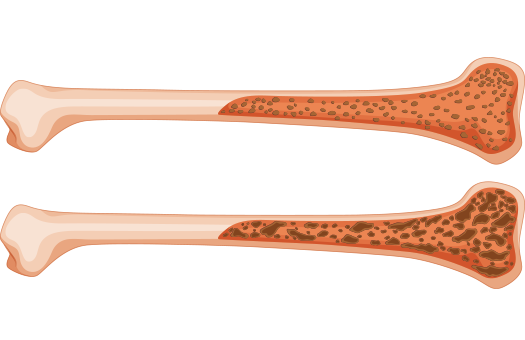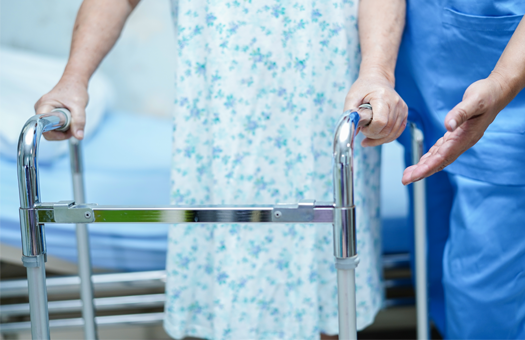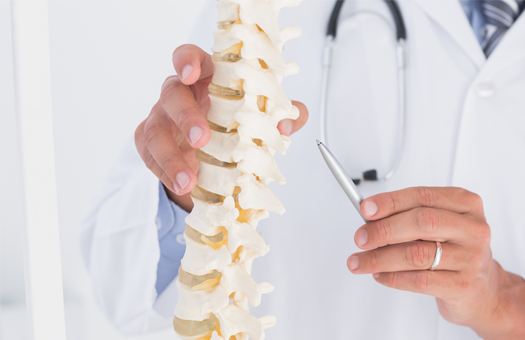Osteoporosis
Menopause causes many changes to a women. Apart from the hormonal changes, osteopenia can also be a problem which in turn can lead to Osteoporosis. This occur due to the lack of essential hormones caused by premature aging.
Many of you might not know that the human bones are living tissues. There are two continuous activities, which are ossification and bone resorption that occurs together throughout one’s life. They are controlled by several types of hormones that help maintain the balance of the calcium in the body.
The hormones that command the building of bones are the Growth Hormones which are from the pituitary gland, thyroid hormone and sex hormone. In females, it is called estrogen. In males, it is called androgen. In addition, Vitamin D and parathyroid hormone are effective in pulling the calcium into the bone for ossification.
The hormones that activate the disintegration of calcium from the bone is calcitonin from the thyroid gland. Calcitonin will be secreted when the body lacks calcium or the calcium is inadequately received. Calcium is an important mineral in the working process of the body, such as contraction of the muscles or transmission of nerve impulses to the target organ or intestine. Calcium plays an important role in attaching with free fatty acid and bile acid, which irritates the intestinal wall. Therefore, by receiving adequate calcium, it can prevent the cause of intestinal cancer.
Calcium will disintegrate from the bones at all times if the body does not receive the calcium in the adequate amount. Therefore, by taking enough calcium or receiving calcium supplements, it can reduce the rate of bone resorption. However, ossification will depend on various hormones as mentioned above. Some people think that by taking calcium, the bones will become thicker. This is a total misconception.
Some people are afraid that by taking too much calcium, the calcium will accumulate at the wrong place of the body like the tendon, muscles, blood vessels or joints. In fact, supplementary calcium is not related to the term wrong calcification. Wrong calcification occurs from the inflammation and expiration of cells. In fact, there is a calcium pump at the cell wall that pumps the calcium in and out of the cells. The pump will not work with cells that are destroyed by free radicals or the inflammation process. When the calcium is accumulated for a long time, it will then accumulate at the wrong place. Therefore, we should take the calcium supplements continuously, especially for those at risk of osteopenia.

Risk Factors of Osteoporosis
-
Elderly people, especially females
-
Having the disease in the family
-
Females with menopause or hysterectomy on both ovaries
-
Caucasian or Asian people
-
Less movement or no exercising
-
People with small and thin shape
-
Eating food with low calcium
-
Food with lots of fat, which will obstruct calcium absorption
-
Heavy smoking
-
Have drinks with alcohol and caffeine, such as coffee and tea, in a large amount regularly
-
Low calcium absorption in those who take some types of medicine, such as thyroid medicines, steroid medicines, and diuretics
-
Those who are ill with endocrine disorders, such as thyroid, diabetes, adrenal gland, long-term splinting, and paralysis

The need of calcium per day in each person is different and the titrations are as follow:
-
Newborn babies to six months old, at least 210 mg is needed per day
-
Seven months old to one year old, about 270 mg is needed per day
-
One year old to three years old, 500 mg is needed per day
-
Four years old to eight years old, about 800 mg is needed per day
-
Nine years old to eighteen years old, about 1300 mg is needed per day
-
In adults of 19-50 years old, those who are 50 years old and above should receive 1200 mg per day
Do note that magnesium is also key in leading the calcium into the cells. The normal ratio of calcium to magnesium in the body is 2:1.
Osteopenia or osteoporosis is due to the imbalance in the osteogenesis level and the level of bone resorption. They occur in various places of the bone and is related with the previous bone growth period. It means that if there is less bone mass during the growth period, for example receiving inadequate calcium during childhood to adolescent, mean a risk of osteopenia later in life.
Symptoms
Osteopenia that does not affect the structure will not have any symptoms. However, most patients with osteopenia often have symptoms due to slumping of the backbone which is the deterioration of backbone joint. This in turn may cause problems like backache, sharp pain to the legs, slouching and staggering or fractures due to osteoporosis. The most common fractures especially in the elderly are hip fracture, spinal fracture, carpal bone fracture and rib fracture, which often occur after a fall.

Treatment Guidelines
-
Nerves rebalancing program for fall prevention
-
Exercise regularly
-
Change of lifestyle, such as stop smoking or drinking alcohol
-
Medication for osteoporosis
-
Have adequate calcium, especially in children and adolescents, which will help to increase peak bone mass and reduce the risk of osteoporosis when older
-
Take Vitamin D, calcium, and magnesium
-
Use hormone replacement as advised by the physicians
-
Checking of the bone mass by using Dexa Scan
Exercise
Low impact exercise is recommended like swimming, walking, yoga, Pilates, step aerobics, ski-like machine (in the fitness center), bike riding, water aerobics and Tai Chi.
Medicine such as bisphosphonate and teriparatide for osteoporosis has many side-effects. Commonly use in Germany, Osteopeptide is an extract from bone cells that consists of peptide of about 30,000 Daltons and can be is a great alternative. It can help to activate the osteoblast to thicken the bones. It is a form of natural therapy, registered as Homeopathy, with very few side effects.




Sign In
Create New Account